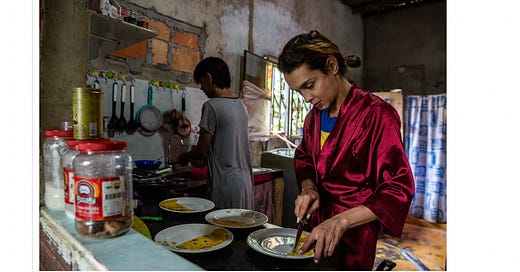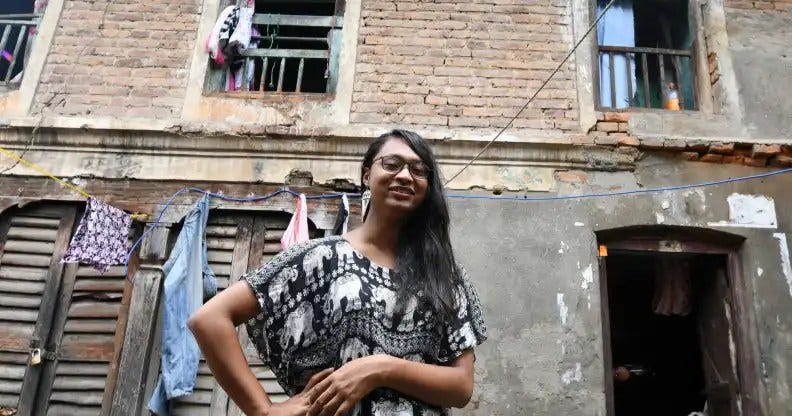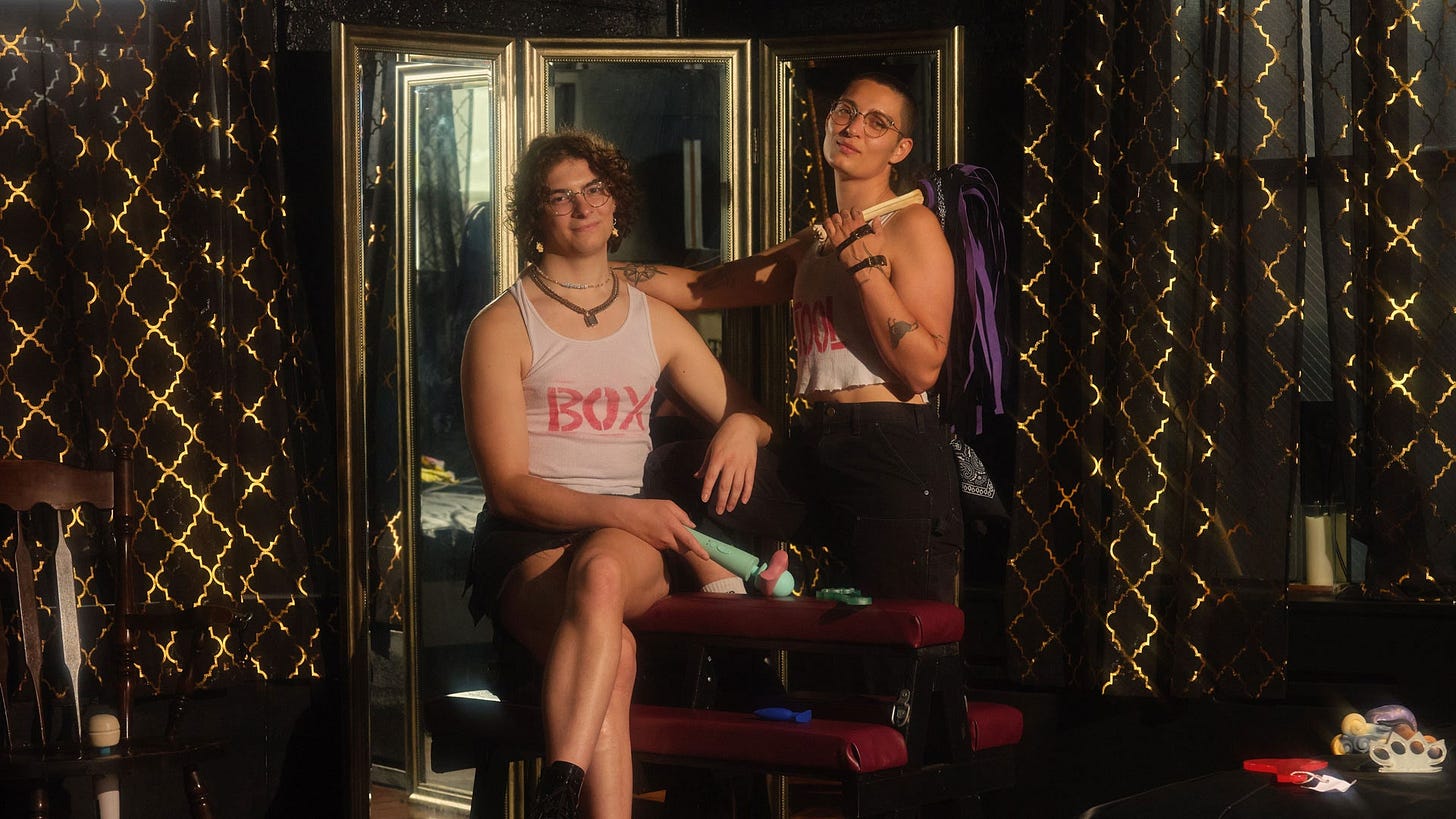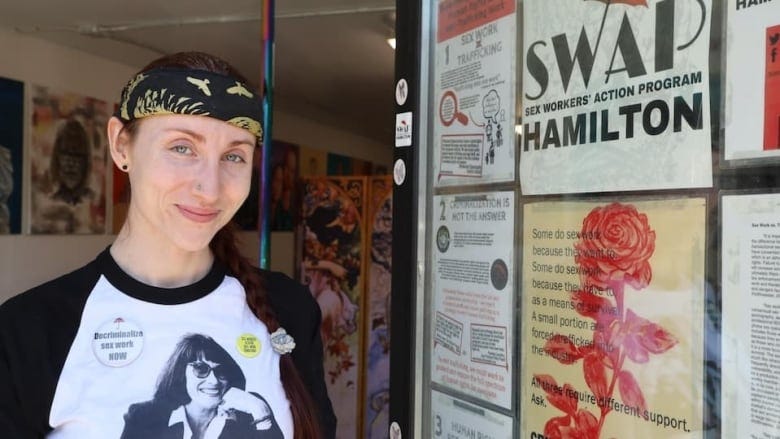Global Roundup: Colombia Trans Women, Nepal Trans Rights, India Women Home-Based Workers, Queer Disabled People & Kink, Canada Sex Workers' Film Festival
Curated by FG Contributor Samiha Hossain
Photograph by Antonio Cascio
Tatiana Cespedes, 51, was working in the hair salon that she had set up in her home when three armed men burst in. She had one week to leave town, they warned her, otherwise she would be killed. The men belonged to one of the many armed groups that still operate in Colombia despite the peace agreement signed in 2016 between the country’s biggest rebel group, the Farc, and the government.
Activists say armed groups are seeking to create a parallel state where those who are seen as damaging society – which for them includes trans women – are punished or killed. Violent transphobic flyers have been appearing on the streets in Caquetá, a stronghold of the armed groups, and circulating through WhatsApp.
The 2016 peace agreement between the Farc and the Colombian government recognised LGBTQ+ people as victims of the conflict and guaranteed them the right to political participation. However, an increase in the activity of armed groups in departments such as Caquetá has led to renewed threats against the LGBTQ+ community. Cespedes believes she was targeted because she had been standing as a candidate in the local council elections. After fleeing, Cespedes moved back home with her mother and set up a new working space in her house – starting all over again has not been easy. She says she tries not to leave the house and lives in fear that someone might recognise her.
We, as trans women, are always looked at. But now, when someone looks at me on the street, I think it is because they have identified me or want to harm me. -Tatiana Cespedes
Trans activists say the government does little to protect them despite the rise in threats, violence and killings. Aurora Iglesias, an LGBTQ+ activist in Caquetá, says:
The prosecutor’s office doesn’t even recognise a trans-femicide. They record all the cases as homicides, not even femicides…we are killed for what we are, not for being beautiful women passing by. We are being killed because the weight of a visible identity has a price. The truth is that every time we leave our houses, we don’t know if we’ll come back. -Aurora Iglesias
The Supreme Court has ruled in favour of Rukshana Kapali (PRAKASH MATHEMA/AFP via Getty Images)
Rukshana Kapali, a law student and human rights activist who was named on the BBC’s 100 Women list, has sued the Nepalese government more than 50 times since 2021 in an effort to bring forth rights-based recognition of gender identity. While the Supreme Court’s landmark ruling has set a precedent for trans rights in the country, other transgender people will need to petition the court separately to have their gender recognised without medical intervention.
For more than a decade, the authorities have been issuing documents which list gender as “other” or “third gender” on the basis of self-ID. However, people wishing to change their markers to “M” or “F” are required to undergo gender-affirming surgery, which usually must take place outside the country, followed by medical assessments and genital examinations in Nepal.
I am very glad and happy this verdict has finally put an end to the discrimination and stigmatisation I faced everywhere I went. My life is going to be easy from now on. -Rukshana Kapal
In February, Manisha Dhakal, the executive director of the LGBTQ+ organisation Blue Diamond Society, told Human Rights Watch (HRW) that:
Generations of transgender and third-gender Nepalis have faced barriers and humiliation because of policy gaps. We need change now. We began the fight for our dignity in 2001 and secured a major victory at the Supreme Court in 2007, but the government has not yet implemented the order to recognise us based on our identities. -Manisha Dhakal
A kite maker - women comprise about 17 million of the 41 million home workers in India
Indian journalist Neha Dixit has released a new book, The Many Lives of Syeda X, shining a spotlight on the invisible lives of India’s neglected female home-based workers. The protagonist Syeda relocated to Delhi with her family in the mid-1990s after religious riots in the neighbouring state of Uttar Pradesh. Reported over 10 years with more than 900 interviews, the book highlights, in part, the precarious life of an Indian home-based female worker.
After being recognised officially as a distinct category of workers only in 2007, India defined a home-based worker as someone who produces goods or services for an employer from their own home or chosen premises, regardless of whether the employer provides equipment or materials. Over 80% of working women in India are employed in the informal economy, with home-based work being the largest sector after agriculture. Yet, no legislation or policy supports these women.
Bereft of social security or any protection, these women are in a constant battle with poverty, precariousness and wayward spouses. Often their family’s main breadwinners, they strive to earn enough to educate their children out of poverty. These women also face the brunt of climate change, losing livelihoods and running losses: monsoon waterlogging in their homes leads to wastage of their supplied material.
Research from Brazil and South Africa shows that monitoring work conditions and protecting workers' rights in subcontracted or home-based work is possible when local governments and trade unions collaborate effectively. Such examples in India are few and far between. A study in Tamil Nadu state by social scientist K Kalpana illustrated how home and neighbourhood-based female workers subcontracted to make appalams (papadum) in Chennai successfully defended their rights, despite government agencies ignoring claims of trade unions. However, Dixit writes how Syeda X and her friends had no such luck.
If she ever took time off to nurse an illness or to attend to her children, her job would be lost to another faceless migrant, fighting to take her place. -Neha Dixit
Photo: Shaun Lucas
Artemis and Greta are the creators of the Toolbox Collective, a sex shop that catered to their community: people who are queer, trans, disabled, and decidedly kinky. To their knowledge, the Toolbox is the first and only trans-owned, queer-centered sex shop in New York City.
I’ve never had the option to come out as disabled, it’s been since day one. Kink gives me a space where my support needs are the crux of what happens, and my ability to be nonverbal is both a tool and a strength. -Greta
Since its opening in January 2024, Toolbox Collective has hosted events and workshops in many different venues and are working toward a permanent brick-and-mortar shop that’s fully accessible. Toolbox Collective comes from a place of necessity and exclusion. Although one in four adults in the U.S. is living with a disability, disabled adults are often infantilized, desexualized, or reduced to harmful tropes. Even in queer and trans spaces, it’s common for disabled people to be treated as an afterthought. Kink, both as a practice and a community, can offer a space where queer and trans disabled people get to experience their own bodies on their own terms.
Today, the internet is transforming how kinky disabled people can find one another. Clinical sexologist and executive director of The Alternative Sexualities Health Research Alliance, Anna Randall, says that approximately 80% of kinksters go online to find community — and that includes Pup Quincy, a 26-year-old living with Multiple Sclerosis and chronic pain. After exploring the New York city play party scene, Pup Quincy decided to fully embrace kink online, especially as various parties began lifting their COVID-19 guidelines. Online, they’ve attended workshops and monthly meet-ups and regularly connect on Discord.
The more I talk to other disabled people, I’m like ‘you guys are fucking smart’. [I] walk away feeling like, oh wow, there’s really so many possibilities to feel good in a world and a body that might feel really fucking bad. The perseverance and resilience to do that all the time is truly one of the most beautiful things in the world to me. -Pup Quincy
Jelena Vermilion with Sex Workers Action Program Hamilton organized what she says is Canada's first Sex Workers' Film Festival. (Submitted by Jelena Vermilion)
What's being touted as the first film festival in Canada showcasing movies and documentaries exclusively about sex workers is set to kick off in the city of Hamilton. The goal is to shift the public's perspective about sex work, says film festival organizer and activist Jelena Vermilion, who runs the outreach group Sex Workers' Action Program (SWAP) Hamilton. American activist Carol Leigh, also known as the Scarlot Harlot, began the first sex workers' film festival in the United States in San Francisco in 1999. Leigh died in 2022 and Vermilion said she felt inspired to set up a similar festival in Canada.
When sex workers aren't being displayed as murder victims or as criminals or victims on the screen, it really allows people to engage with their humanity at a deeper level. -Jelena Vermilion
Kathleen Cherrington, a critical sex work studies researcher at York University, said these types of film festivals take place in many other countries, but this will be the first on Canadian soil that she knows of. Hamilton's inaugural Sex Workers' Film and Arts Festival will take place at local movie theatres this week. There will also be live performances and art exhibits. Sex workers will have free admission and seven films will be screened over the two days.
New York-based filmmaker PJ Starr's documentary Manifesting Monica Jones, the rough-cut version, is among the films being screened. Starr will also be at the festival and cap it off with a question-and-answer session. Starr said the film festival is important because it creates a safe space for sex workers and their allies and imagines a much different future.
I know Jelena is a visionary, so I am excited to see what she will bring. It's very aspirational. -PJ Starr
Thank you for reading Global Roundup. You can support FEMINIST GIANT by:
Hitting the heart button so that others can be intrigued and read
Upgrading to a paid subscription to help keep FEMINIST GIANT free
Opting for a one-time payment via buying me a coffee
Sharing this post by email or on social media
Samiha Hossain (she/her) is an aspiring urban planner studying at Toronto Metropolitan University. Throughout the years, she has worked in nonprofits with survivors of sexual violence and youth. Samiha firmly believes in the power of connecting with people and listening to their stories to create solidarity and heal as a community. She loves learning about the diverse forms of feminist resistance around the world.








